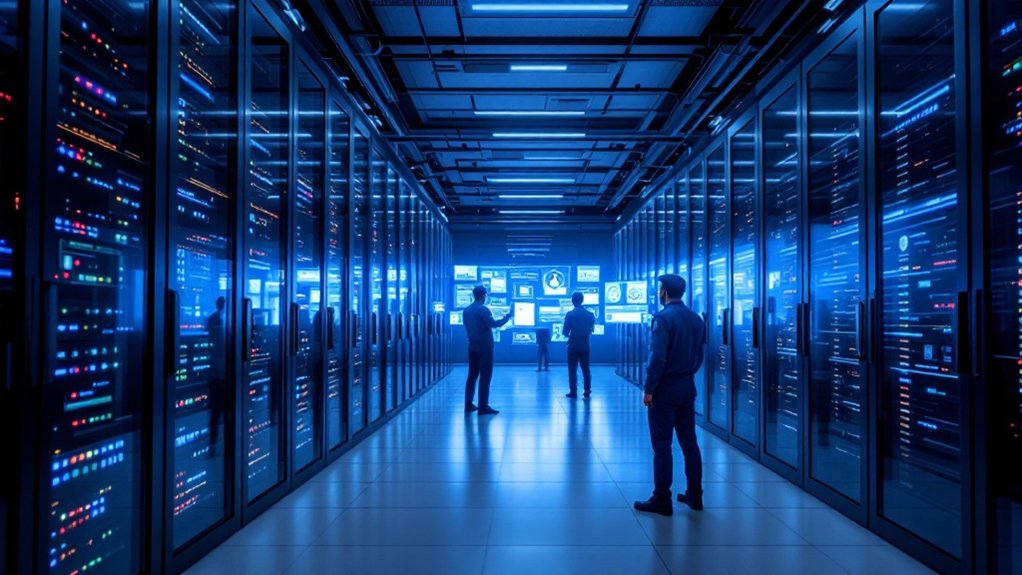The rapidly evolving digital landscape has made data center security a topic of paramount importance. With an array of techniques ranging from robust physical measures to sophisticated network security protocols, the task can seem overwhelming. Businesses need to understand these methods in-depth, knowing how each contributes to a thorough and proactive security posture. So, what are these top security techniques, and how can they safeguard your data center? Let’s find out.
Understanding the Importance of Data Center Security
In today’s digital world, the importance of data center security cannot be overstated. As hubs for storing, processing, and distributing vast volumes of information, data centers play an indispensable role in the functioning of businesses across industries. Security breaches, whether through cyberattacks or internal threats, can lead to devastating loss of valuable data, financial losses, and damage to a company’s reputation. Protecting these data centers has become a top priority for organizations. Implementing robust security measures, such as firewalls, intrusion detection systems, and encryption, can help to safeguard sensitive data. Furthermore, establishing a thorough security policy and conducting regular audits can guarantee that these measures remain effective in the face of evolving threats. Additionally, data management services are essential for protecting databases from security breaches and ensuring information integrity.
The Role of Physical Security Measures in Data Centers
The role of physical security measures in data centers cannot be underestimated. This includes implementing access control systems, establishing surveillance and alarm systems, and ensuring robust fire prevention measures. Each of these is pivotal in safeguarding sensitive data and maintaining the integrity of the data center. Furthermore, data breaches can be effectively mitigated through the integration of comprehensive security protocols and constant monitoring.
Implementing Access Control Systems
While data centers may seem impervious to threats due to their digital nature, physical security measures play an essential role in safeguarding valuable information. One of the most effective measures is implementing access control systems. These systems regulate who can enter the data center and restrict unauthorized individuals from accessing sensitive areas. They often include card readers, biometric scanners, or keypad entries. The system logs each entry and exit, providing a detailed record of who accessed the data center and when. This not only deters potential intruders but also guarantees accountability within the organization. Consequently, a robust access control system is a vital component of data center security, forming the first line of defense against physical intrusion.
Surveillance and Alarm Systems
Beyond the domain of access control systems, surveillance and alarm systems serve as essential physical security measures in data centers. These systems work in tandem to detect, monitor, and respond to potential security breaches. Surveillance systems, such as closed-circuit television cameras (CCTVs) and motion detectors, enable continuous monitoring of data center facilities. They provide real-time visibility and recording capabilities, which can aid in the identification of unauthorized activity. On the other hand, alarm systems function as responsive mechanisms that trigger alerts upon detection of breaches or suspicious activities. This could range from door alarms indicating unauthorized access to vibration sensors alerting of structural breaches. Together, surveillance and alarm systems form a robust defensive layer against physical threats to data centers.
Fire Prevention Measures
Given the catastrophic damage that fires can cause, implementing robust fire prevention measures is critical in the physical security strategy of data centers. These measures include installing state-of-the-art fire suppression systems that can rapidly detect and extinguish fires without causing damage to electronic equipment. Fire-resistant building materials can also be used to prevent the spread of flames. Regular inspections and maintenance of systems to detect any fire hazards are equally important. Additionally, data centers can implement strict protocols to control the use of flammable materials within the premises. Finally, efficient emergency plans and staff training to handle fire-related incidents can greatly reduce the potential damage. Consequently, proactive fire prevention can enhance data center security and guarantee business continuity.
The Essentials of Network Security in Data Centers
In the domain of data centers, network security stands as an essential fortress. It serves as the first line of defense against potential cyber threats aiming to exploit sensitive information. Implementing robust network security protocols mitigates risks such as unauthorized access, data breaches, and system downtimes. These protocols include the use of intrusion detection systems (IDS) and intrusion prevention systems (IPS), which monitor network traffic for suspicious activities and block them respectively. Additionally, the application of encryption techniques and virtual private networks (VPNs) guarantees data integrity during transmission. Finally, routine security audits and vulnerability assessments are vital in identifying potential weaknesses and reinforcing the security framework. As a result, network security plays a pivotal role in maintaining a secure and efficient data center environment. Furthermore, participating in data center webinars provides clients with insights on best practices in network management.
How Firewall Systems Contribute to Data Center Security
Firewall systems play a fundamental role in securing data centers. This section will explore the nature of these systems, discuss various strategies for their deployment, and consider the importance of maintenance in ensuring continued security. These aspects are essential to understand the overall contribution of firewall systems to data center security. Additionally, partners must demonstrate extraordinary talent in their field to effectively implement and maintain these systems.
Understanding Firewall Systems
How essential, one might ask, is a firewall system to the overall security of a data center? A firewall system is the first line of defense in securing a data center’s information assets. It serves as a gatekeeper, monitoring and controlling incoming and outgoing network traffic based on predetermined security rules. Firewalls can be either hardware or software-based and are often used in conjunction with other security measures to fortify a data center’s defense against cyber threats. They function by establishing a barrier between secured and controlled internal networks and external networks such as the internet. By scrutinizing network traffic and blocking data packets that don’t meet the secure criteria, firewalls contribute considerably to the overall security of a data center.
Firewall Deployment Strategies
While many assume that merely installing a firewall system is enough, the strategy of its deployment plays an essential role in fortifying a data center’s security. Firewalls should be strategically placed to monitor and control all traffic, both incoming and outgoing. A layered approach, utilizing both internal and perimeter firewalls, increases protection against threats. The deployment of next-generation firewalls (NGFWs) that have integrated intrusion detection and prevention systems (IDS/IPS) can provide advanced security features. The use of virtual firewalls in virtualized or cloud-based environments also contributes to thorough security. Each firewall deployment strategy should be customized based on the specific needs of the data center, ensuring that all potential vulnerabilities are effectively addressed.
Maintaining Firewall Security
Securing a data center goes beyond the initial deployment of firewall systems. Maintaining firewall security is a continuous process that demands vigilance and regular updates to fend off evolving threats. Firewalls, much like the walls of a fortress, are designed to keep unauthorized access out while still allowing necessary data flow. They serve as a protective barrier, scrutinizing inbound and outbound traffic based on pre-set rules and protocols. However, without regular updates and rule modifications, they can become vulnerable. Hence, a strict maintenance regimen involving periodic checks, rule reviews, and software updates is essential. This guarantees that the firewall remains a strong, adaptive line of defense, capable of handling new security concerns and preserving the integrity of the data center.
Intrusion Detection and Prevention Systems: A Critical Component
Although many organizations overlook it, the implementation of Intrusion Detection and Prevention Systems (IDPS) is a vital component of data center security. These systems are designed to identify potential threats and respond swiftly to prevent any harmful intrusion. They function by continually monitoring the network for unusual activity or discrepancies. Once an anomaly is detected, the IDPS alerts the system administrators or takes direct action to mitigate the threat. IDPS can be hardware or software-based and are typically deployed at the edge of a network to act as the first line of defense. While these systems do not replace the need for other security measures, their role in identifying and preventing cyber threats is undeniably essential in maintaining the integrity of data centers. Effective database management planning is crucial to ensure that IDPS are properly integrated into the overall security framework.
The Power of Encryption in Protecting Data Center Information
Undeniably, encryption plays a powerful role in safeguarding data center information. It converts data into a code to prevent unauthorized access. With myriad cyber threats lurking in the digital world, encryption is a crucial security measure for data centers.
There are several types of encryption, including symmetric and asymmetric. Symmetric encryption uses the same key for encryption and decryption, ideal for bulk data processing. Asymmetric encryption, on the other hand, utilizes two keys: a public key for encryption and a private key for decryption, providing a higher level of security.
Furthermore, encryption helps to maintain data integrity and confidentiality. Even if hackers penetrate the security perimeter, encrypted data remains unreadable and useless to them. Consequently, encryption is a resilient line of defense in data center security.
Importance of Regular Security Audits and Compliance Checks
While encryption serves as a formidable barrier against data breaches, regular security audits and compliance checks are equally paramount in guaranteeing a robust data center security. These audits involve a thorough examination of the system to identify vulnerabilities that could be exploited by malicious entities. On the other hand, compliance checks guarantee the data center adheres to the necessary laws and regulations, such as the General Data Protection Regulation (GDPR). Regular audits and compliance checks not only help in detecting potential threats but also provide an opportunity to rectify security flaws. They guarantee that the data center’s security measures are up-to-date and effective against evolving cyber threats, making them indispensable components of an effective security strategy.
Role of Artificial Intelligence and Machine Learning in Data Center Security
In the domain of data center security, the advent of artificial intelligence (AI) and machine learning (ML) has sparked a revolution. These technologies play a significant role in enhancing security by detecting anomalies, identifying potential threats, and automating responses. AI and ML algorithms can process vast amounts of data and identify patterns that might go unnoticed by human analysts. They can predict potential security breaches based on historical data and initiate preventive measures. Furthermore, they have the ability to learn and adapt to changing threats, thereby improving their performance over time. However, the implementation of these technologies requires a careful strategy to avoid data privacy issues and guarantee the system’s reliability.
Future Trends in Data Center Security Techniques
What does the future hold for data center security techniques? The advent of technologies like artificial intelligence, machine learning, and blockchain has already begun reshaping this landscape. Experts predict a growing reliance on these tools to bolster security protocols. Quantum computing, while still in its infancy, is also expected to play a significant role in the future of data center security. Its potential to break traditional encryption methods could revolutionize the way data centers protect information. Additionally, expect a rise in the use of biometric authentication techniques for access control, providing an added layer of security. Finally, as cyber threats evolve, so too will the methods to counter them, necessitating continuous innovation in data center security techniques.
Frequently Asked Questions
What Is the Cost of Implementing Comprehensive Data Center Security Measures?
The cost of implementing extensive data center security measures varies greatly. Factors include the size of the data center, the chosen security technologies, and the complexity of the system. Costs can range from thousands to millions.
How Do We Train Staff Effectively in Data Center Security Protocols?
Effective training in data center security protocols involves a combination of theoretical learning, practical exercises, and regular updates on emerging threats. This guarantees staff are well-equipped to handle any security challenges they may encounter.
What Are Some Common Challenges in Maintaining Data Center Security?
Common challenges in maintaining data center security involve managing human error, dealing with insider threats, constant technological updates, detecting and mitigating cyber threats, and maintaining compliance with ever-changing industry regulations and standards.
How Frequently Should Data Center Security Systems Be Updated or Replaced?
The frequency of updating or replacing data center security systems depends on various factors. These include technology advancements, threat assessment, system vulnerabilities, and regulatory requirements. Regular audits guarantee ideal protection against potential security breaches.
Can Data Center Security Measures Affect System Performance or Availability?
Yes, data center security measures can affect system performance or availability. While adding layers of protection, they may slow down operation speeds. However, the impact is typically minimal and outweighed by the benefits of enhanced security.
Conclusion
In summary, robust data center security is achieved through a multi-faceted approach. Physical security measures, network security protocols, encryption of sensitive data, regular security audits, and AI-aided threat detection all play crucial roles. As technology evolves, so too will data center security techniques. Staying abreast of these trends will guarantee data centers remain secure, thereby protecting sensitive information and maintaining the trust of those who depend on their services.






